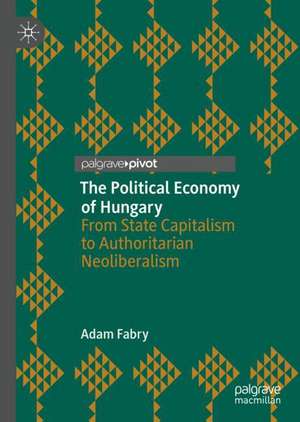The Political Economy of Hungary: From State Capitalism to Authoritarian Neoliberalism
Autor Adam Fabryen Limba Engleză Hardback – 13 apr 2019
Preț: 452.79 lei
Nou
Puncte Express: 679
Preț estimativ în valută:
86.65€ • 90.13$ • 71.54£
86.65€ • 90.13$ • 71.54£
Carte tipărită la comandă
Livrare economică 15-29 aprilie
Preluare comenzi: 021 569.72.76
Specificații
ISBN-13: 9783030105938
ISBN-10: 3030105938
Pagini: 198
Ilustrații: XIII, 170 p.
Dimensiuni: 148 x 210 mm
Greutate: 0.38 kg
Ediția:1st ed. 2019
Editura: Springer International Publishing
Colecția Palgrave Pivot
Locul publicării:Cham, Switzerland
ISBN-10: 3030105938
Pagini: 198
Ilustrații: XIII, 170 p.
Dimensiuni: 148 x 210 mm
Greutate: 0.38 kg
Ediția:1st ed. 2019
Editura: Springer International Publishing
Colecția Palgrave Pivot
Locul publicării:Cham, Switzerland
Cuprins
1. Introduction.- 2. Rethinking the Political Economy of Neoliberal Transformation in Central and Eastern Europe.- Chapter 3: The Pre-1989 Origins of Neoliberalism in Hungary.- 4. The Neoliberal Reconfiguration of the Hungarian Political Economy, 1990-2006.- 5. From Poster Boy to Basket Case: Hungary and the Global Economic Crisis, 2007-10.- 6. The Consolidation of the Orbán Regime.- 7. Towards ‘Authoritarian-Ethnicist Neoliberalism’?.- 8. Conclusions.
Notă biografică
Adam Fabry is Research Fellow for the Technical Research Council in the Centre for Study on Culture and Society at National University of Córdoba, Argentina. He currently researches the comparative political economy of neoliberalism in Eastern Europe and Latin America. He has previously published in journals, such as Capital & Class, Competition & Change, and Eszmélet, as well as blog posts for LeftEast and Jacobin.
Textul de pe ultima copertă
This book explores the political economy of Hungary from the mid-1970s to the present. Widely considered a ‘poster boy’ of neoliberal transformation in post-communist Eastern Europe until the mid-2000s, Hungary has in recent years developed into a model ‘illiberal’ regime. Constitutional checks-and-balances are non-functioning; the independent media, trade unions, and civil society groups are constantly attacked by the authorities; there is widespread intolerance against minorities and refugees; and the governing FIDESZ party, led by Prime Minister Viktor Orbán, controls all public institutions and increasingly large parts of the country’s economy. To make sense of the politico-economical roller coaster that Hungary has experienced in the last four decades, Fabry employs a Marxian political economy approach, emphasising competitive accumulation, class struggle (both between capital and labour, as well as different ‘fractions of capital’), and uneven and combined development. The author analyses the neoliberal transformation of the Hungarian political economy and argues that the drift to authoritarianism under the Orbán regime cannot be explained as a case of Hungarian exceptionalism, but rather represents an outcome of the inherent contradictions of the variety of neoliberalism that emerged in Hungary after 1989.
Caracteristici
Makes the case that the double transformation in post-communist Central and Eastern Europe (CEE) needs to be understood in relation to the wider restructuring of the capitalist world economy from the early 1970s onwards Demonstrates how ‘proto-neoliberal’ ideas and practices emerged in Hungary in the late 1970s and early 1980s, as a response by domestic elites to the deepening crisis of Soviet-style state capitalism Claims that the Orbán regime represents a model state of ‘authoritarian-ethnicist neoliberalism’, which is becoming increasingly popular not only in Europe and the US, but also elsewhere in the world
